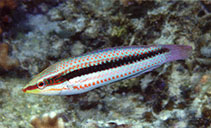| Family: |
Labridae (Wrasses), subfamily: Corinae |
| Max. size: |
9.56 cm SL (male/unsexed) |
| Environment: |
reef-associated; marine; depth range 1 - 3 m |
| Distribution: |
Western Central Pacific: Philippines and Malaysia. |
| Diagnosis: |
Dorsal spines (total): 9-9; Dorsal soft rays (total): 12-12; Anal spines: 3-3; Anal soft rays: 12-12; Vertebrae: 25-25. This species is characterized by the following: D IX,12; A III,12; pectoral rays 14; lateral-line scales 27; head naked but nape fully scaled; most scales of straight anterior part of lateral with a middle surface tubule forming 3 short branches ending in a pore, with the middle branch usually longest; suborbital pores 10-13; gill rakers 18-20; body depth 3.15-3.6 in SL; head length (HL) 2.9-3.0 in SL; snout length 2.85-3.25 in HL; dorsal spines progressively longer posteriorly, last 3 subequal, 2.85-3.4 in HL; caudal fin moderately rounded, 1.35-1.5 in HL; upper half of body dark brown, males with 5 narrow pale bars extending from base of dorsal fin; lower half of body pale brown, the centres of scales darker; a dark brown band from upper lip to lower half of orbit, extending posterior to eye, half as broad, to base of opercular flap; 3 narrow dark bars extending dorsally from postorbital band, the first black and vertical, just behind eye, the posterior 2 bands irregular; a boomerang-shaped dark brown band extending posteriorly from behind corner of mouth across cheek; fins are translucent pale yellowish, dorsal with a broad black band across middle of first 2 membranes; rest of fin with longitudinal rows of faint, dark-edged, pale spots (3 per membrane); anal fin with a row of faint, dark-edged, pale spots along base; caudal fin with faint transverse bands; paired fins pale, the pectorals with a triangular black spot dorsally on base, narrowing to a line across remainder of base; peritoneum dark brown (Ref. 85096). |
| Biology: |
Occurs in a sheltered habitat of mixed coral, algae, sand and gravel (Ref. 85096). Found in small groups or solitary (Ref. 90102). |
| IUCN Red List Status: |
Not Evaluated (N.E.) Ref. (130435)
|
| Threat to humans: |
harmless |
Source and more info: www.fishbase.org. For personal, classroom, and other internal use only. Not for publication.
